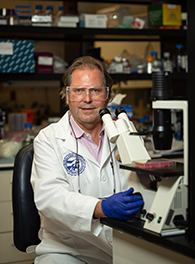Richt to lead study investigating troubling swine disease virus
Monday, Dec. 16, 2024
MANHATTAN — A Kansas State University distinguished professor is working to address the emerging threat that Japanese encephalitis virus, a zoonotic pathogen, poses to U.S. swine health.
K-State's Jürgen A. Richt is one of six researchers to receive funding from the Swine Health Information Center and the Foundation for Food & Agriculture Research for the Japanese Encephalitis Virus Research Program. A total of $1.3 million has been awarded to six projects to enhance the United States' prevention, preparedness, mitigation and response capabilities for Japanese encephalitis virus, or JEV.
Richt is a regents distinguished professor, a university distinguished professor in diagnostic medicine and pathobiology, a Kansas Bioscience Authority eminent scholar in the College of Veterinary Medicine and a member of the National Academy of Medicine. He is the principal investigator on a project exploring the development of a new pregnant sow model to study the development of the JEV genotype IV.
As a transboundary disease risk for U.S. introduction, JEV is transmitted through the bite of infected mosquitos and can cause reproductive failure, abortions, and stillbirths or weak piglets in swine breeding herds. Richt’s study aims to develop robust and harmonized in vivo and in vitro methods for comparative analysis of infected pregnant sows across two study centers; conduct JEV infection trials at three gestational time points at each site; and determine the pathobiological features of in utero infection and compare across the two study centers.
"This is an exciting project studying an emerging zoonotic pathogen in collaboration with our Australian colleagues," Richt said. "Understanding the potential impact of this virus on pregnant sows will allow us to rapidly respond and mitigate the risk of this emerging swine disease threat."
The project is being conducted in collaboration with the Australian Centre for Disease Preparedness in Geelong, Australia.

